If you told me today that I was going to war, and I had to choose my kit right now… do you know what optic I would take?
I’d bypass all the Eotechs, Aimpoints, Nightforces, Leupolds, and Schmidt and Benders of the optics world and settle on one optic, the Trijicon ACOG.
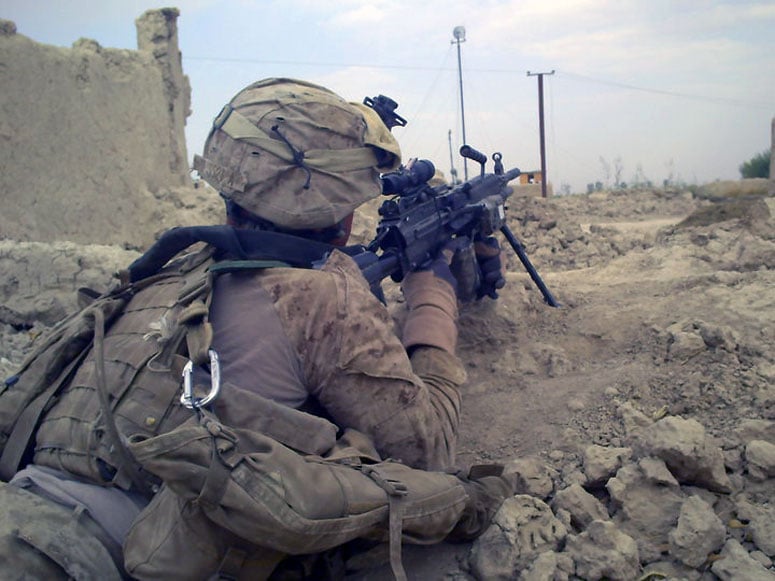
Find out why… plus how to figure out the best model for you (since there’s a lot of them).
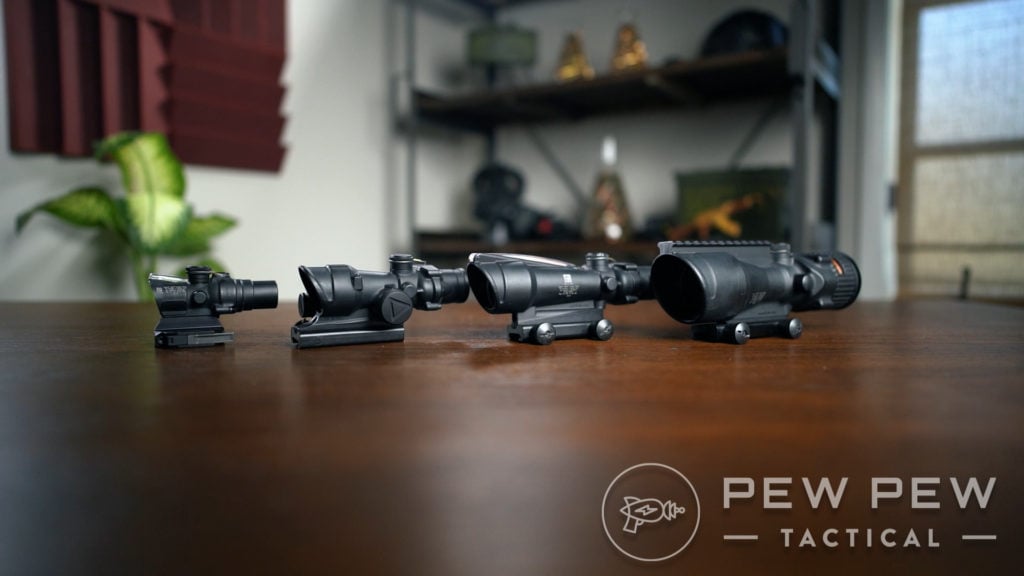
Now complete with a full YouTube video too:
Table of Contents
Loading…
Why the ACOG?
Well, it helps I’ve already been to war with it once.
I’ve also trained extensively with it, put thousands and thousands of rounds downrange with one, and would genuinely trust my life to it.
Of all the gear that I carried and was issued two pieces stand out to me, the M240B machine gun and the Trijicon ACOG.
They were two pieces of kit I have no complaints about and never saw fail.
I’ve seen combat with ACOG, and it performed admirably under pressure, and the design’s versatility and simplicity made it stand out. We’ll take a little more on this later, for now, let’s look at what an ACOG is.
What is an ACOG?
ACOG is a name for an entire line of optics that vary in size, reticle magnification, and even illumination power.
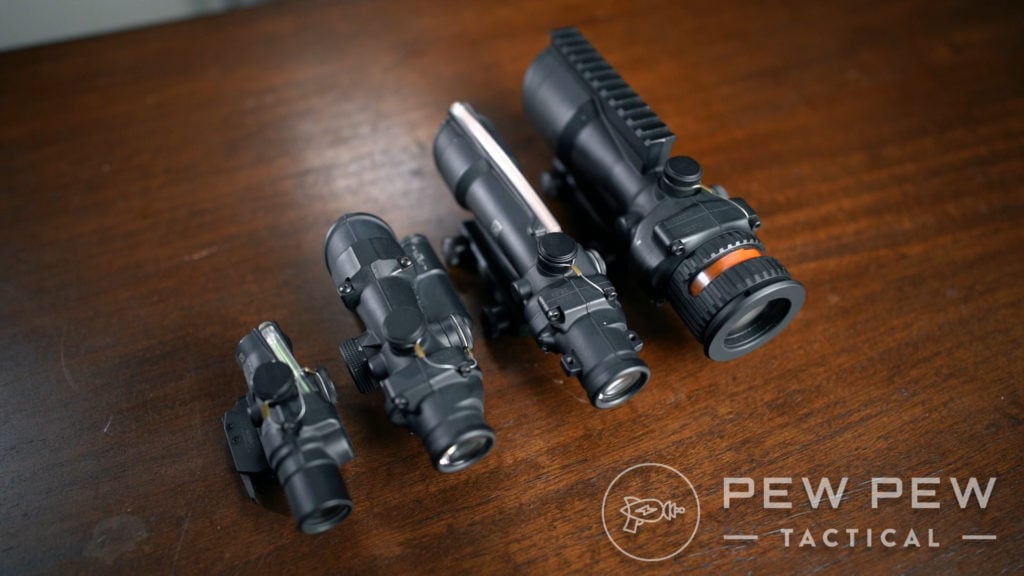
ACOG stands for Advanced Combat Optical Gunsight. These are fixed power optics that can range from 1.5x to 6x with plenty of options in between.
There are a total of 12 different ACOG variants, with well over a dozen different reticle combinations. While some come powered via battery, but they are mostly known for using a mixture of tritium and fiber optics to illuminate the reticle.
Here’s a comparison chart straight from Trijicon (full image here):
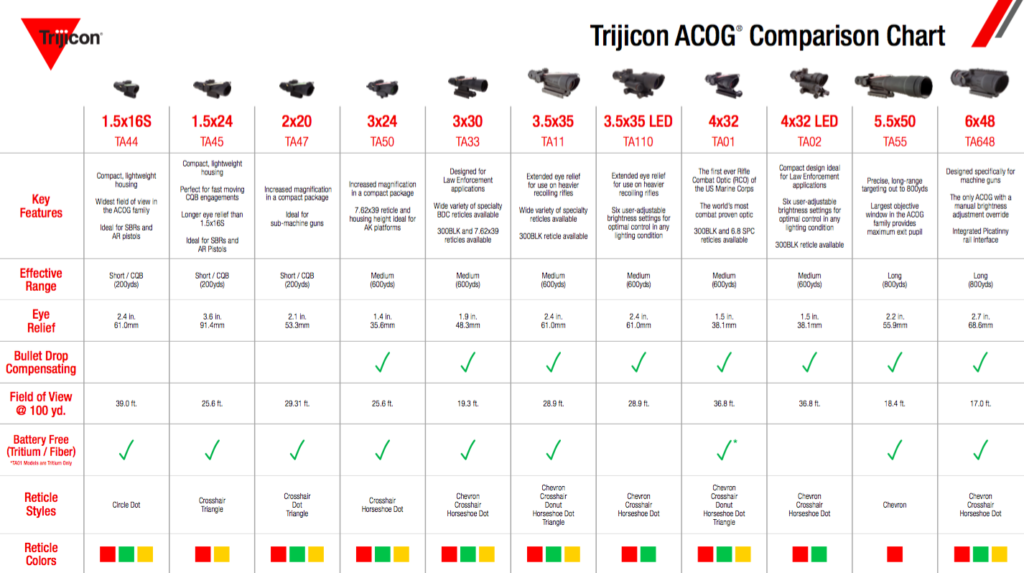
The fiber optics absorb light and power it during the day. In the absence of light, the tritium kicks in and gives the reticle a slight glow.
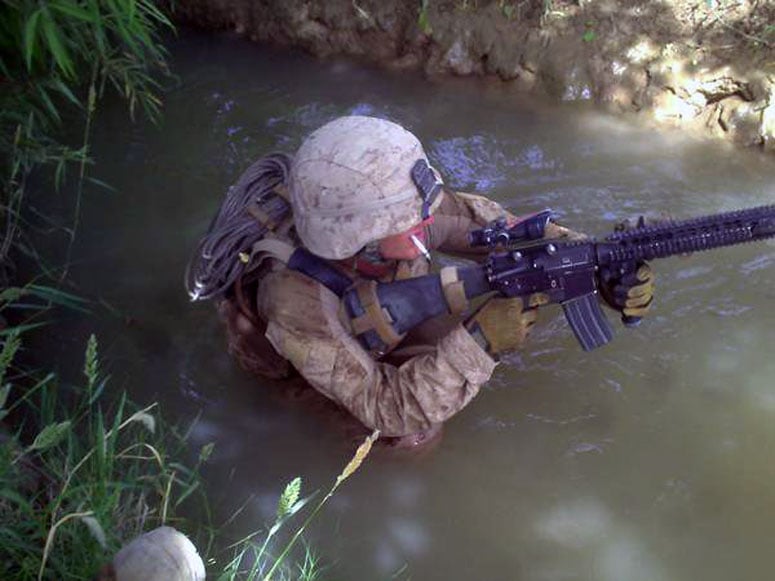
That long red tube you see on top of ACOG is where light is absorbed and used to illuminate the optic.
There are some cons though. The system self-regulates. This means the brighter it is outside, the brighter the reticle is. It is night vision compatible as well.
My Experience
My experience is tied to the oh so sexily named and not confusing at all TA31RCO-A4CP and TA31RCO-M4CP ACOGs.
Prices accurate at time of writing
Prices accurate at time of writing
-
25% off all OAKLEY products - OAKLEY25
Copied! Visit Merchant
The optics are identical, but the A4CP was designed for the M16A4 and the M4CP for the M4 Carbine. The difference between the two is easy to miss and is due to the fact the optic uses a BDC, and the rifle’s barrel lengths are different.
The difference in barrel lengths creates a difference in ballistics to include bullet drop.
These particular models are 4X with a 32mm objective lens. Both optics utilize the same BDC reticle layout that extends out to 800 meters.
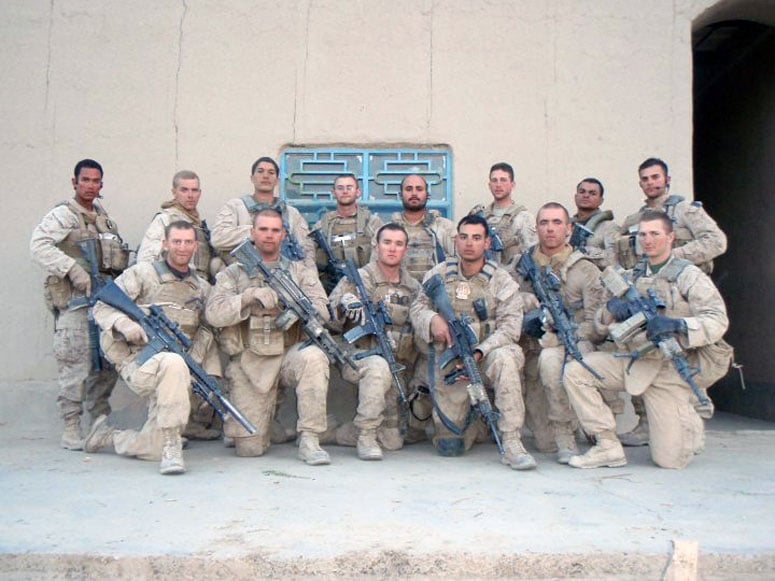
BDC reticles are extremely common on ACOG scopes. The vast majority of ACOG reticles incorporate some form of BDC.
When it comes to known distance ranges, I’ve only ever gone to out to 500 yards with the ACOG. I will attest out to 500 yards, after the meter to yards conversion is done, it’s dead on. It made rifle qual every year a walk in the park.
The Reticle
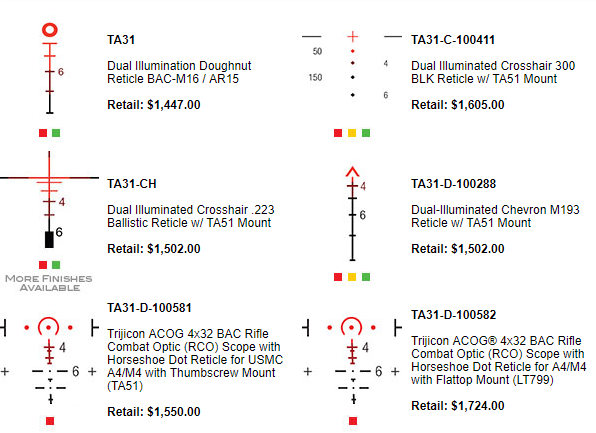
If you’re not familiar with a bullet drop compensating, or BDC, you should be.
These specific reticles are popular on most ACOGs and provide predetermined aiming points for bullet drop. The reticle is very specifically tuned to the type of 5.56 load, projectile weight, and the barrel length.
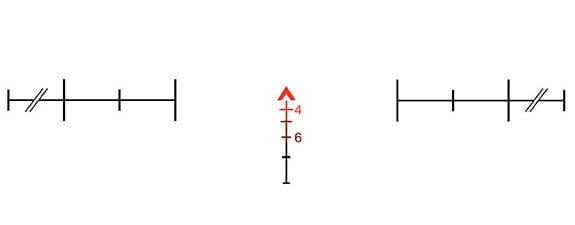
The reticle has predetermined aiming points that allow you to place that aiming point on a target and have a reasonable expectation that the round will hit the target. As you can see it’s somewhat self-explanatory. The 4 and 6 are used for 400 and 600 meters respectively.
What’s not explanatory is where do you aim at the 100, 200, and 300-meter line? Well, I can explain, or I can steal a slide from a USMC presentation…
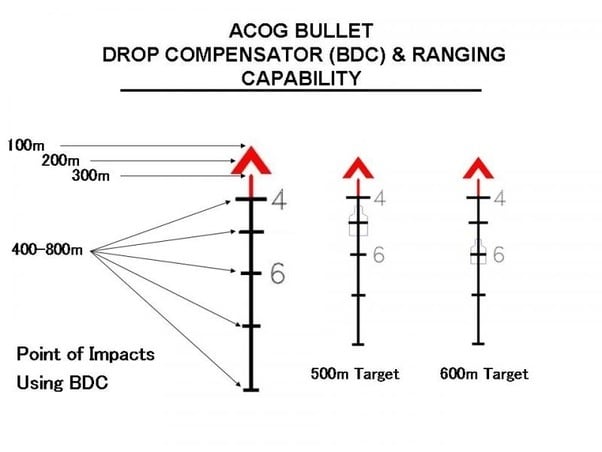
Does this make a little more sense now?
If you look to your right, while keeping your hands and arms in the vehicle, you may notice the target perfectly aligning in width with drop down hash marks. Also please notice how the hash marks are slowing getting shorter as they descended.
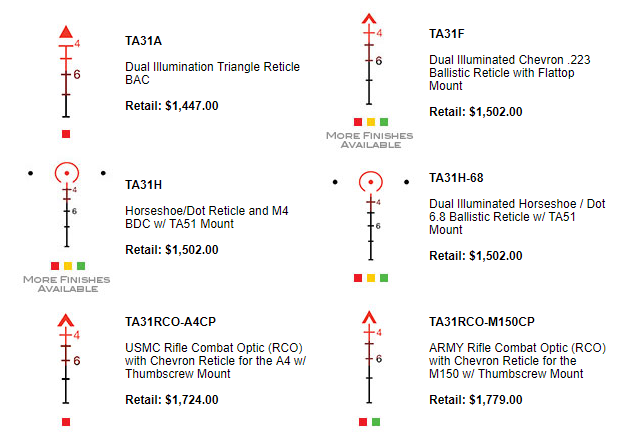
Why is That?
The reticle also has a built-in rangefinder.
The hash marks, starting at 400 yards are designed to replicate the width of an average man’s shoulders. Since targets get smaller as they get further from the shooter the lines are.
In the USMC we shoot at 500 yards on man sized targets and the lines work perfectly. It was always something we made sure to note for young Marines.
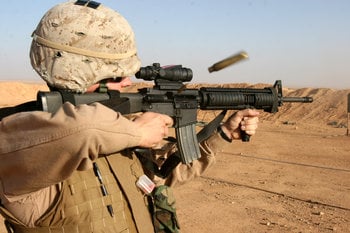
Admittedly in combat, this isn’t exactly easy to use outside of an ambush situation. It’s merely a tool for the box and does allow for scoping suspicious characters carrying AKs.
What Else Rocks about the ACOG?
The ACOG is a near invincible optic.
In my experience, it’s a freakin’ tank. Going to war is one big test for sure, but people don’t understand just how rough predeployment training can be.
We go hard in the desert, in the snow, everywhere. Lots of time on the range and in the field. They get roughed up, and they bounce off walls in MOUT, they ride in Humvees, MRAPS, Tracks and more.
My second deployment had me going out to sea with a Marine Expeditionary Unit. This gave the ACOG plenty of time to be exposed to salt water and bumped and dumped in places like the UAE, Romania, Spain, Djibouti, and a few more.
After two deployments and five years with an ACOG equipped weapon, I have never had one break on me.
I’ve also never seen one go down when used by another Marine. I know more than one guy who was carrying an ACOG when they were hit with an IED.
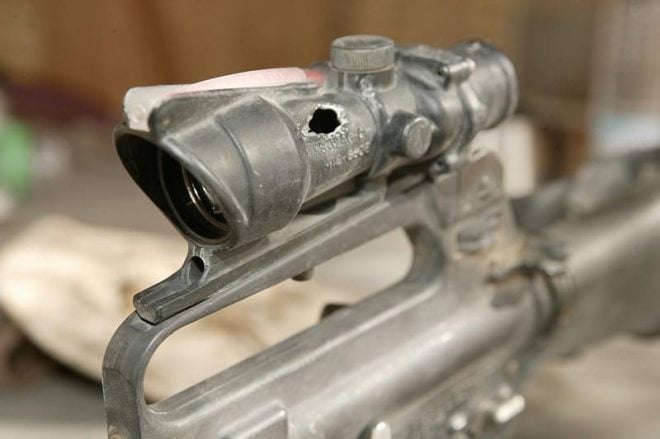
One literally stopped a bullet and saved a Marine’s life once….
Thankfully outside of some minor injuries, my friends and their ACOGs were perfectly fine. From Trijicon’s website, the ACOG is drop proof, shockproof, fog proof and can be fully submerged to 100 meters.
Our Own Torture Testing
Recently we did some torture testing of high-end optics…and the ACOG triumphed.
Water submersion…easy.
Cold and hot temperatures affecting zero…pssh.
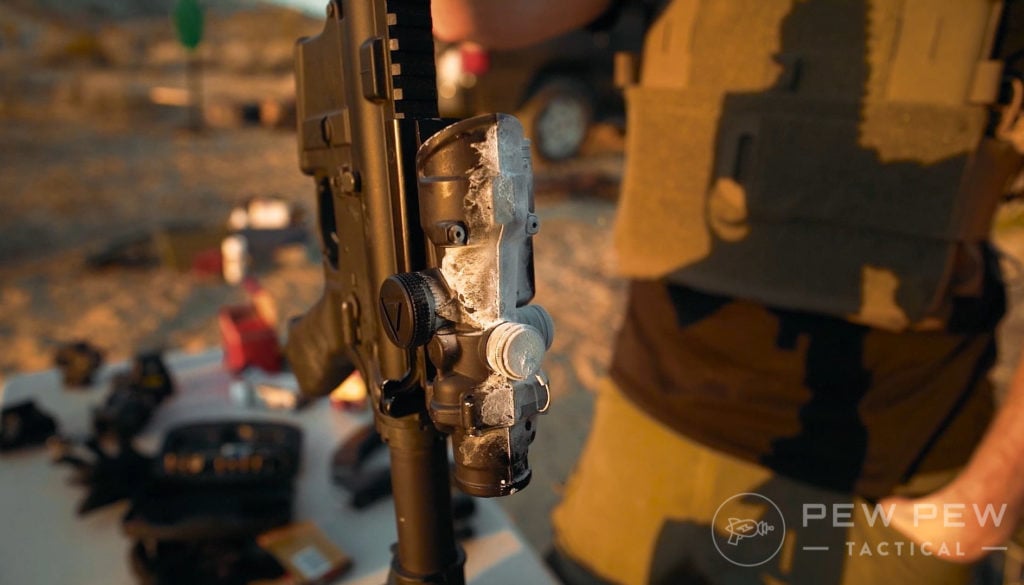
Then we shot it…starting from rat shot to .410 #9 birdshot, 12ga #7.5 birdshot, and finally .22LR Mini-Mag.
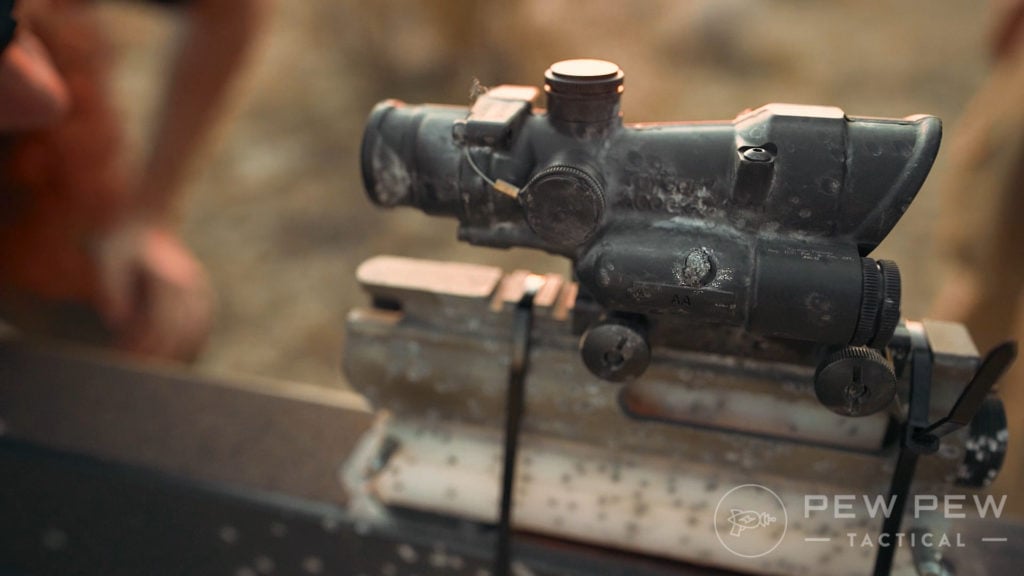
It was a perfect shot on the battery compartment…but the rest of the optical system was untouched.
Zero held too.
Check out the full High-End Optics Torture Test to see what happened to the EOTechs and Aimpoints in the test…
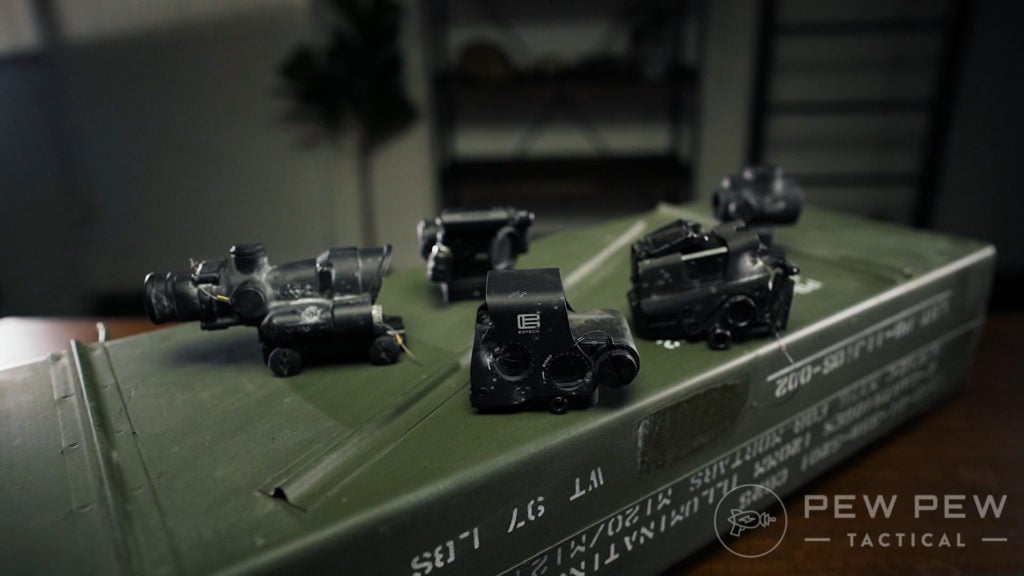
Clarity?
Usually, clarity is something we all love to talk about when it comes to optics, but with the ACOG it seems like clarity is second to everything else. However, it does need to be mentioned eventually.
The Trijicon ACOG is a brilliantly clear optic. The glass is magnificent and extremely strong. It allows you to see and differentiate between different potential targets easily.
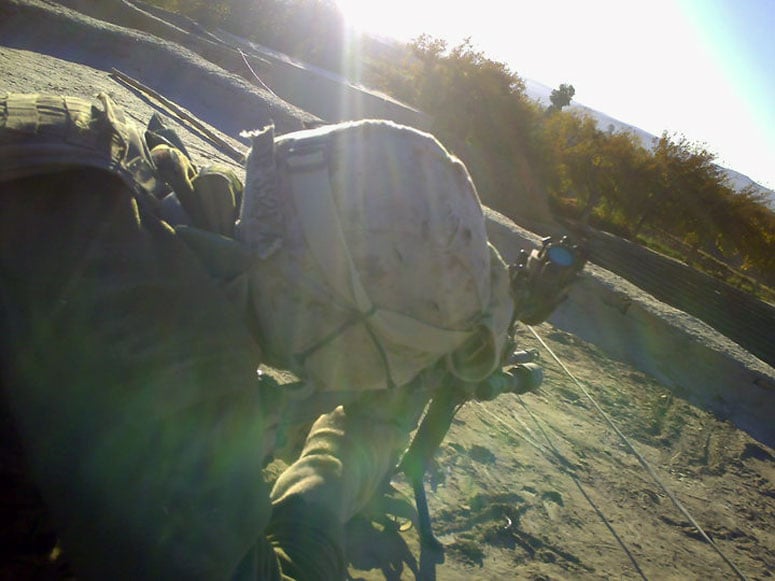
The optic does exceptionally well in low light situations, and unless it is pitch black, you’ll be able to use the optic at night. The ACOG’s clarity was a big deal to us.
We used our ACOGs to scope any and everything. This includes trash that could be bombs, guys who could be carrying AKs, and for doing more mundane tasks like spotting crossing for the canals that were all around the countryside.
What About Close Quarters?
One thing I always hear regarding the ACOG is, “What about CQB?” How do you use a 4x optic in close range shooting?
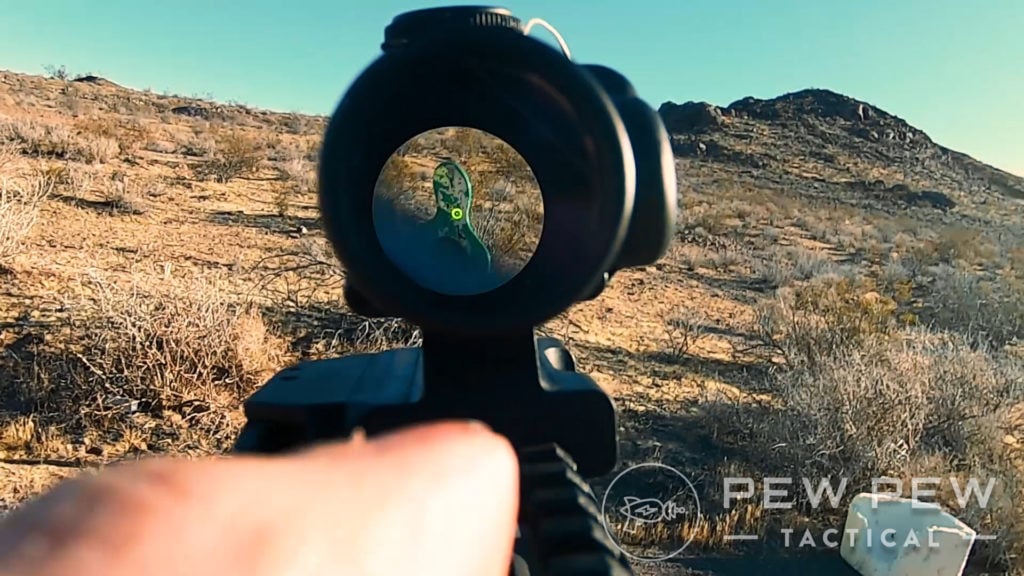
That’s a good question, but it’s one easily answered. The ACOG can be just as useful as a red dot scope when you employ the Bindon Aiming Concept. The Bindon Aiming concept was created by Trijicon founder Glyn Bindon.
Not every ACOG reticle is compatible with the Bindon Aiming Concept, but most are. The reticle has to give sufficient contrast to the background of the target.
The BAC is simple, just keep both your eyes opened when you are looking through the optic. Your dominant eye should be focusing through the optic, and your nondominant eye should be observing the field in front of you.
When focusing on a close quarters target the optic will act almost like a red dot.
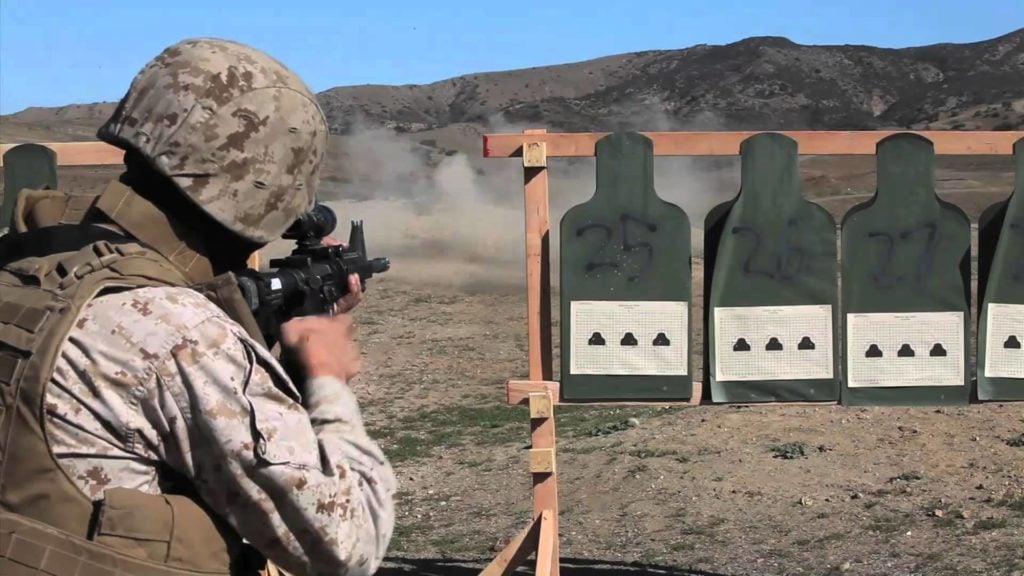
With the reticle superimposed over your vision and works extremely well. The brain is taking two images, the magnified image, and the unmagnified image and combine them together. The end result is a red dot just placed over your vision.
We shooting a number of ‘Tables’ in the Marine Corps. Tables in the Marine Corps are a set of shooting drills all combined into one long exercise. Tables 2,3, and 4 all fired at relatively close ranges.
After a lot of practice, I became pretty damn good with the Bindon Aiming Concept. To go back to the magnified view you can either close your nondominant eye or learn to focus with just your dominant eye.
The real way to use the BAC is to learn how to alternate focusing your eyes.
ACOG Downsides
So as much as I love this optic, it’s not entirely perfect. The ACOG is designed for combat, and a lot of its advantages do have a few cons.
Battery-free illumination is excellent, and a self-regulating reticle is also pretty handy. The problem arises when its super bright outside the reticle becomes super bright. Too bright to be honest.
A universal cure in the Marines was to place tape over the red strip that collects light. That would often help dim the reticle just a bit. Afghanistan is a sunny place, but the reticle would get bright enough to make your eye uncomfortable.
Also, the reticle auto adjusts to where you are, not where your target is. If you are in a dim environment, like inside a building, and aiming at something outside that’s a bit brighter your reticle will still be dim.

It’s even worse if you are in a bright environment and aiming into a dark background. The reticle will make it almost impossible to see your target inside a darkened environment with a raging red reticle.
The issue with using tritium to gather light is that it will eventually die. This does take years, and years to ever happen, but it will die. This can be a hard pill to swallow when you are looking at spending 1200 or more dollars on a scope.
There are now battery powered ACOGs that found a way to beat this problem. They are limited to only a few models though.
Best ACOGs

Since we’ve already taken a peek at the USMC’s ACOGs (TA31) I figured we can shop around a bit and show off some of the other ACOGs out there.
And keep in mind the retail prices we show are pretty different (lower) than the MSRPs shown in the YouTube video.

1. Trijicon TA02 4×32 ACOG
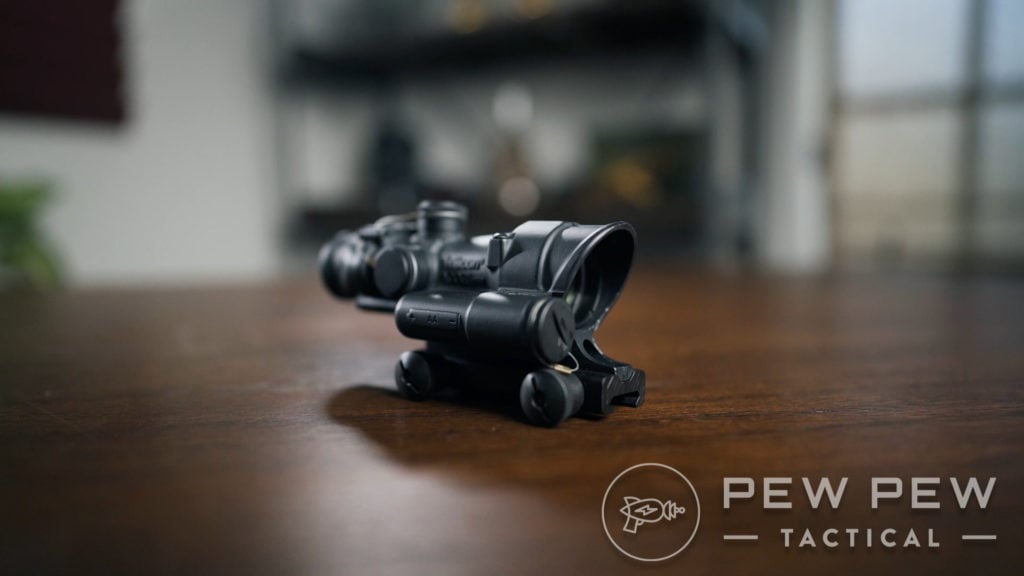
First up, we’ve got the Trijicon TA02, which actually does utilize a single AA battery to illuminate the .223 reticle inside the optic – the first ACOG model to offer user-selectable levels of brightness.
As mentioned above, an occasional criticism of other ACOGs that use tritium or fiber optics to illuminate the reticle is that direct light or shadow on the optic can occasionally give you a mismatch in illumination compared to your environment – and obviously being able to select that illum level yourself works around that.
Right off the bat, you’re going to notice that most models of ACOG are going to have some pretty shallow eye-relief, meaning you’re going to need the correct standoff distance between the length of pull on your gun to use this thing correctly.
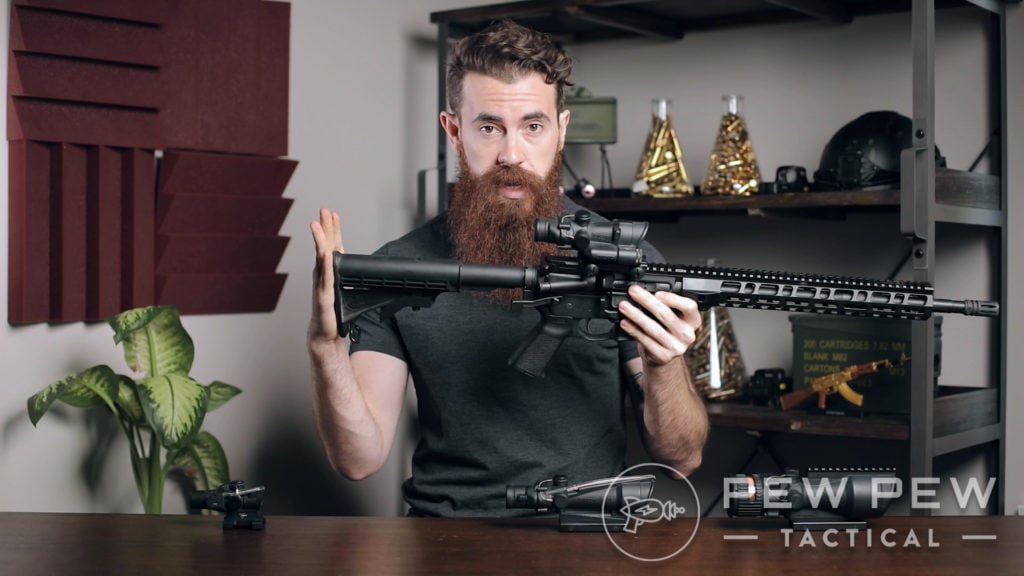
As a result, target acquisition isn’t super fast, but again, it’s a 4x optic and that’s not really what it’s meant to be used for.
That being said, the reticle is BRIGHT in daylight conditions, and the brightness adjustment knob has a super handy feature where each click between brightness levels turns the optic off. We much prefer that option compared to most other optics on the market where you’ve gotta scroll from 1 all the way back to 11 if you need the highest brightness setting.
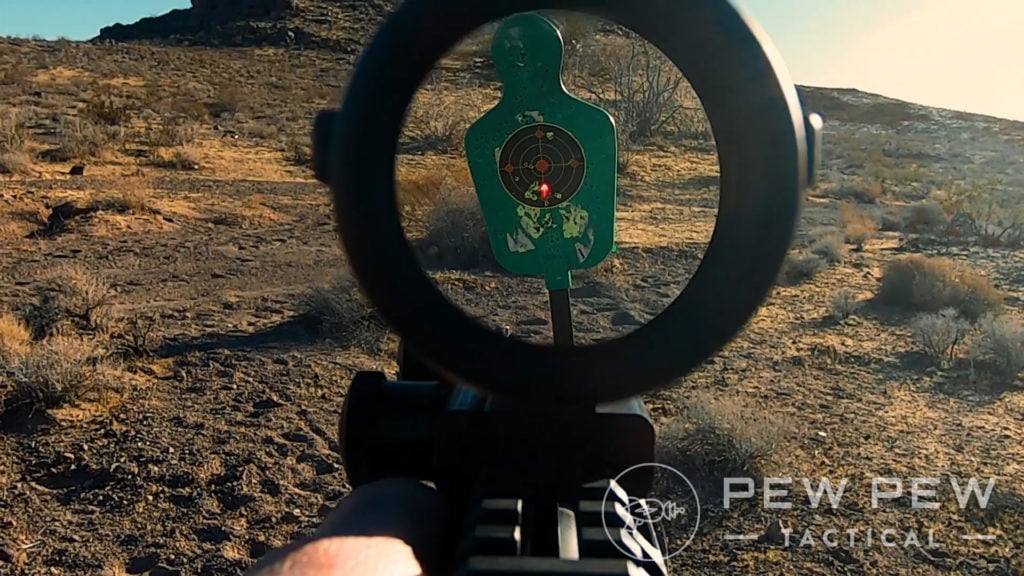
The reticle itself is sort of the classic ACOG chevron, and includes bullet drop calculations for .223 all the way out to 800m, though unfortunately our local desert spot only punches out to about ~200 or so.
The TA02 includes a thumbscrew picatinny mount that’ll mount directly to your gun’s rail, though it can be removed if you need or want to mount it to an AR carry handle for whatever probably stupid reason.
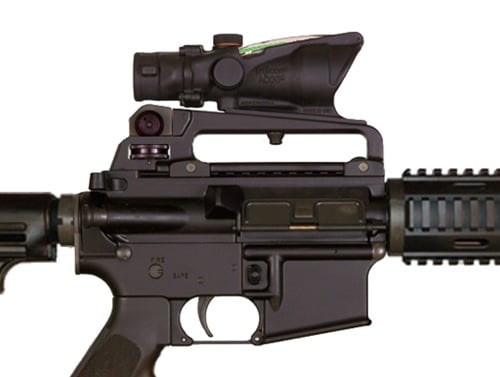
The optic also includes an RMR mount that sits a tiny bit further forward than what you’ll find on most other ACOGs, giving you the option to have a back up red dot for close-range shots when 4x is overkill.
Trijicon also advertises the TA02 as night vision compatible, though we suspect that’s probably aimed more at mounting a PVS14 or something similar on your gun itself, as attempting to crane your neck over to aim through an ACOG while wearing NODs sounds like it’d suck pretty hard.
Prices accurate at time of writing
Prices accurate at time of writing
-
25% off all OAKLEY products - OAKLEY25
Copied! Visit Merchant
With an MSRP of about $1,500 or so, the TA02 is a bit brutal on the wallet – though there’s a definite step up in both the illumination and the crystal clear quality of the glass that comes along with that price tag, thankfully.
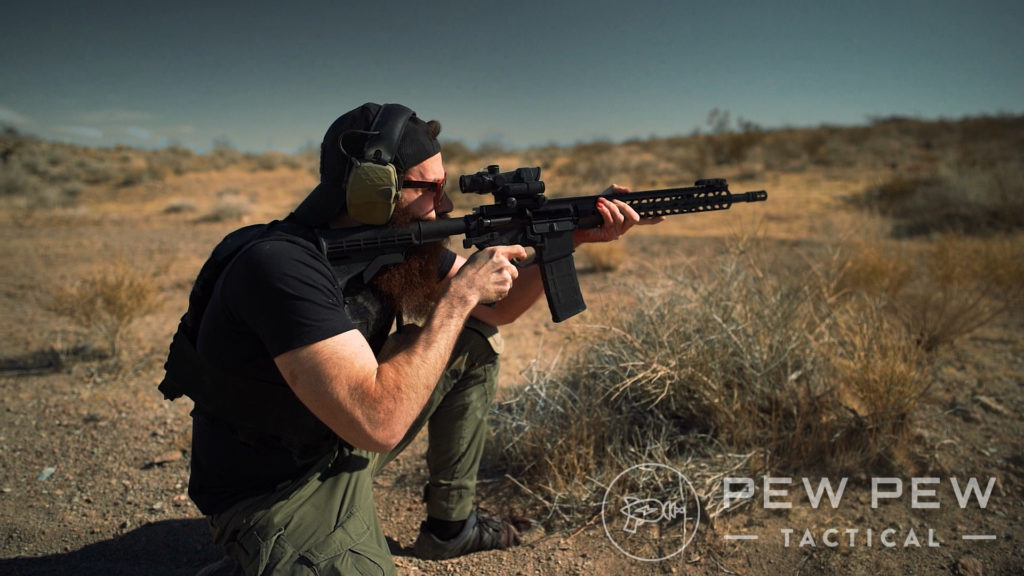
2. Trijicon TA648 6x48mm ACOG
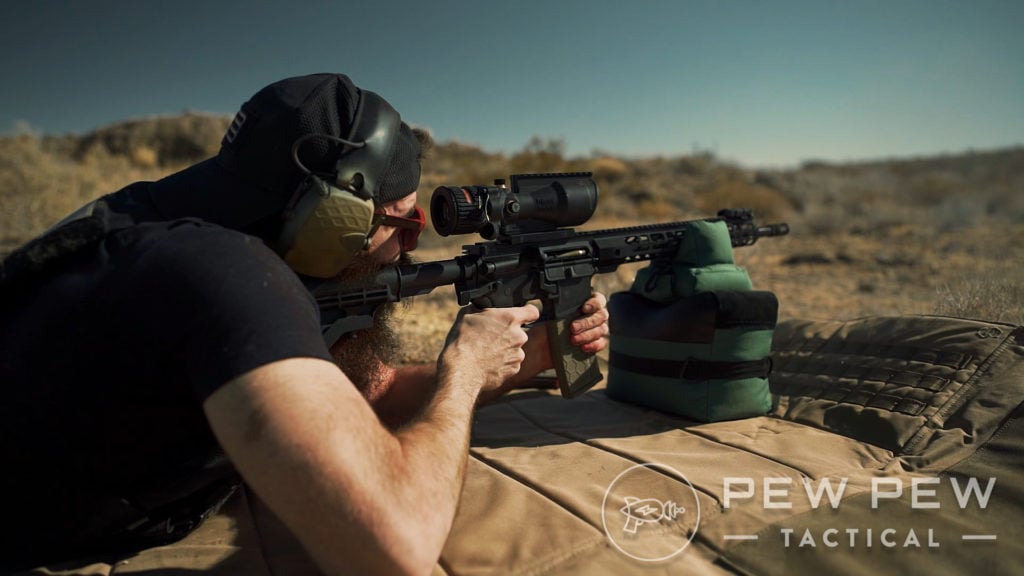
Up next, we’ve got the super chunky TA648 – a 6x riflescope that utilizes both tritium and a fiber optic scrolly wheel thing to deliver illumination to its reticle.
Using the same type of chevron found in the TA02, the 648 is apparently specifically tuned to the ballistic trajectory of the issued M855 round, and indicates via a tiny ‘A4’ in the optic itself that it’s meant to be paired with the 20” barrel of an M16A4.
The reticle is a bit more dim on the 648 than on other models, but it’s definitely still visible in bright conditions.
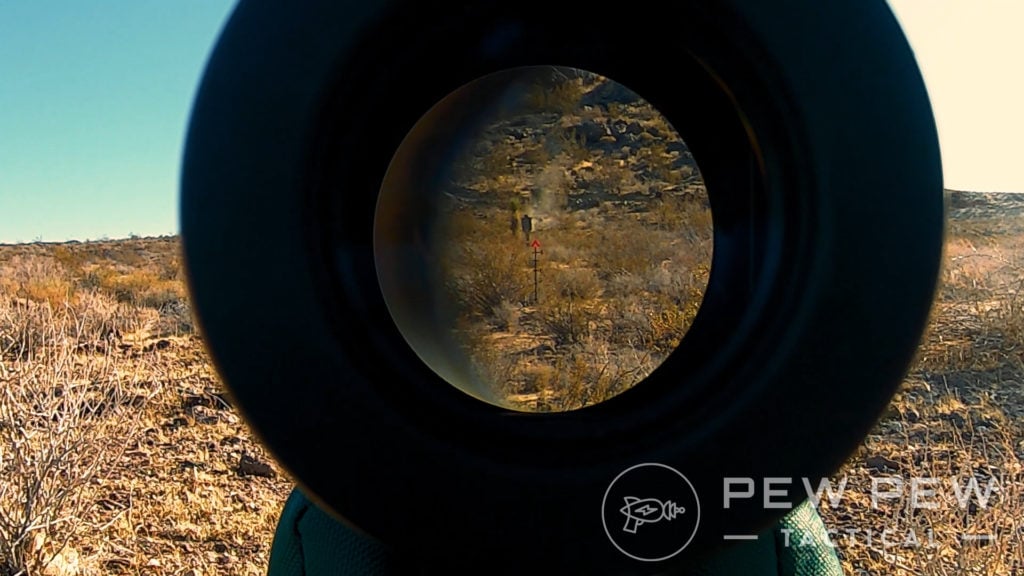
The fiber optic wheel also allows you to only use the tritium glow if you find yourself in darker conditions, but you’re definitely going to want to keep that bad boy opened up if you’re in anything close to bright midday sun.
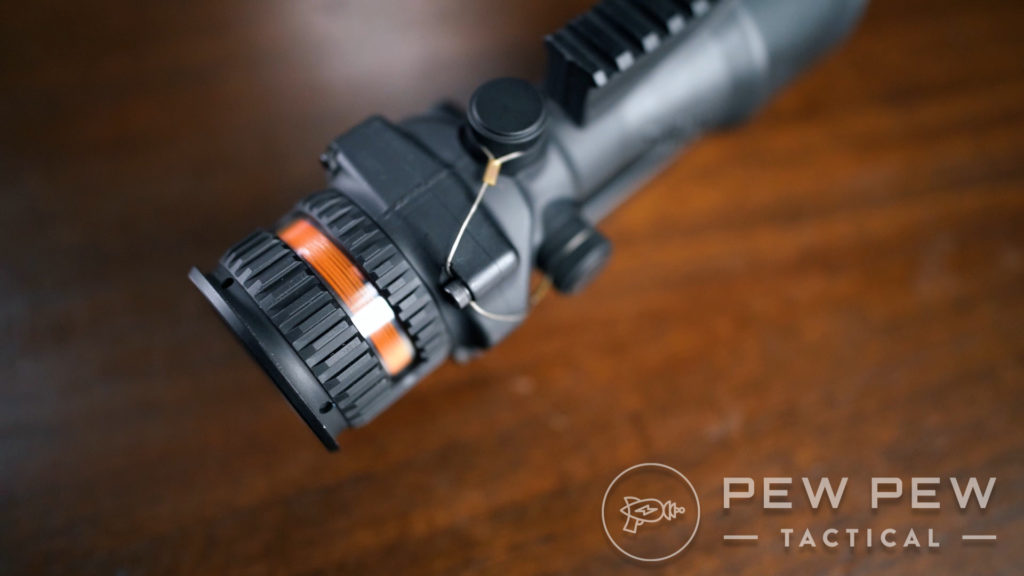
However, this is maybe one of the heaviest optics we’ve ever had the chance to play with, coming in at a thicc 2lbs, 6oz. However, the optic’s own weight does itself mitigate the already minimal recoil on our PSA AR seen here – making follow up shots while stationary quite nice considering the reticle doesn’t move much.
You’ve also got a massive amount of rail space on the 648 – enough to mount a full size micro red dot on the optic if for whatever reason you wanted something a bit bigger than an RMR.
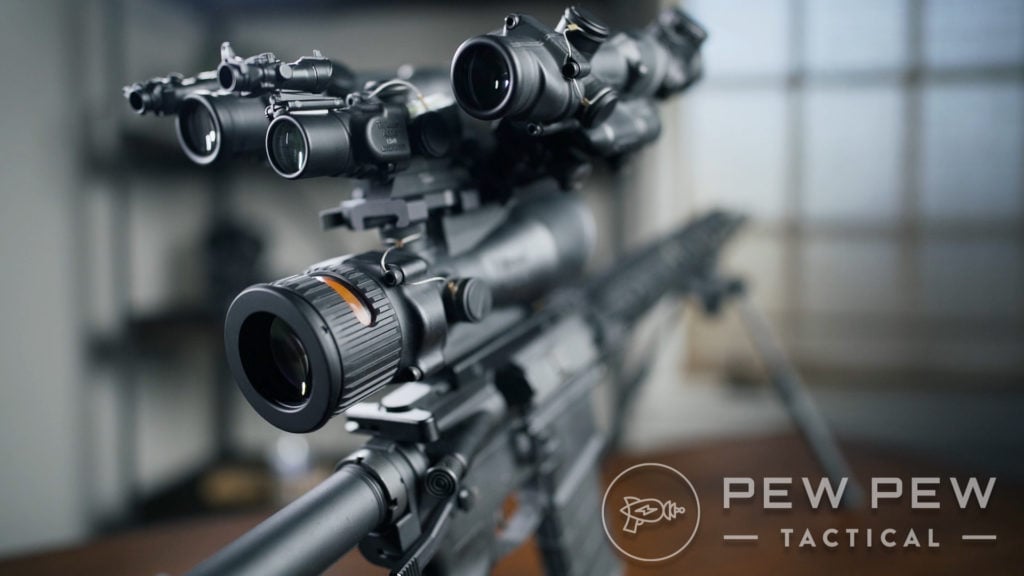
It’s worth noting that the bulk of the 648 can make accessing your charging handle a little bit annoying if you’re not running an upgraded one, as the optic itself sorta gets in the way. It’s not world-ending, but it is slightly obnoxious.
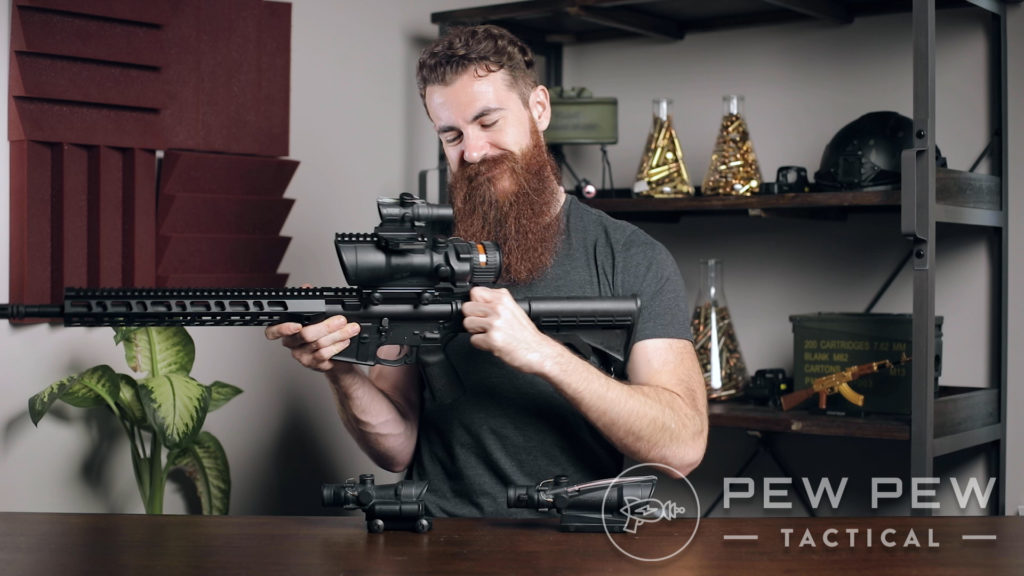
With an MSRP of approximately 3,000 dollars, the TA648 is obviously not going to be for everyone – considering the vast majority of us probably don’t spend anywhere near that on our army of poverty pony AR-15s.
Prices accurate at time of writing
Prices accurate at time of writing
-
25% off all OAKLEY products - OAKLEY25
Copied! Visit Merchant
BUT, if you’re inclined to pick up a fixed, 6x riflescope with a dope reticle, and a level of bombproof construction that feels like you could beat someone to death with it – maybe takeout another mortgage and grab one.
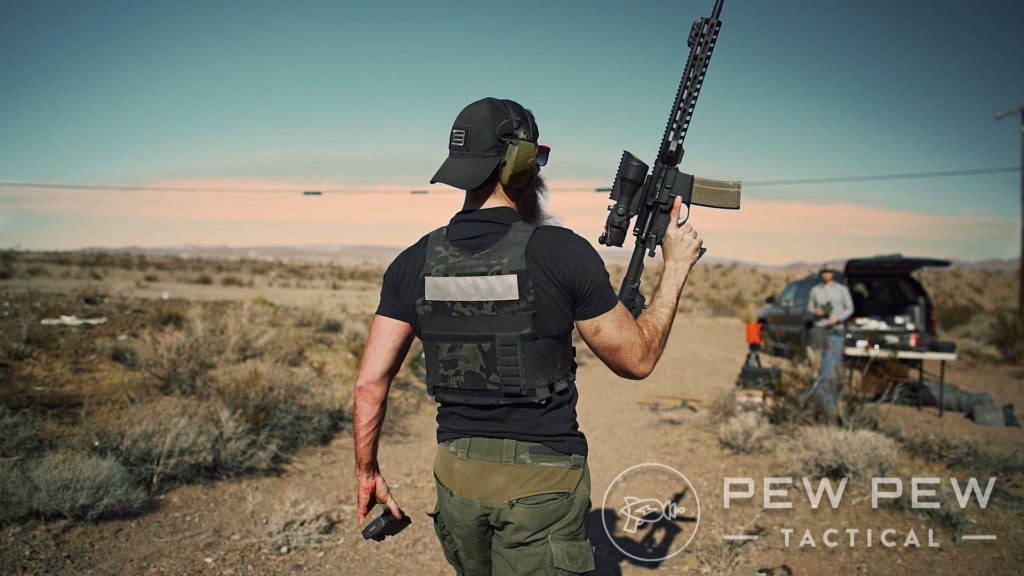
What’s your take on the big boy ACOG?
3. Trijicon TA11F 3.5x35mm ACOG
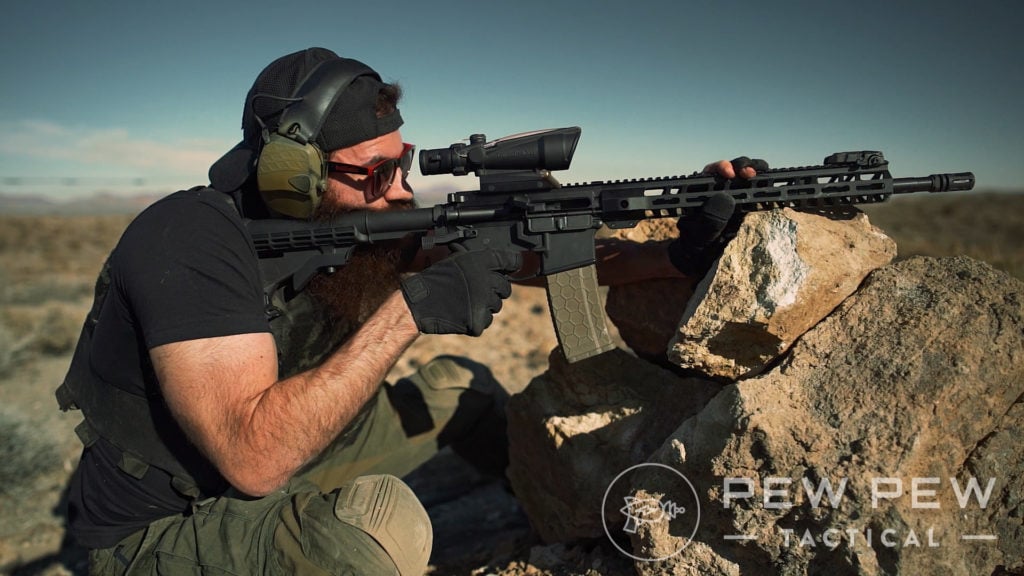
Next! The TA11F – a 3.5x ACOG specifically tuned for the M193 cartridge.
Prices accurate at time of writing
Prices accurate at time of writing
-
25% off all OAKLEY products - OAKLEY25
Copied! Visit Merchant
Again, same chevron reticle as before, but notably the fiber optic on this ACOG runs from the front of the optic almost all the way back to the rear.
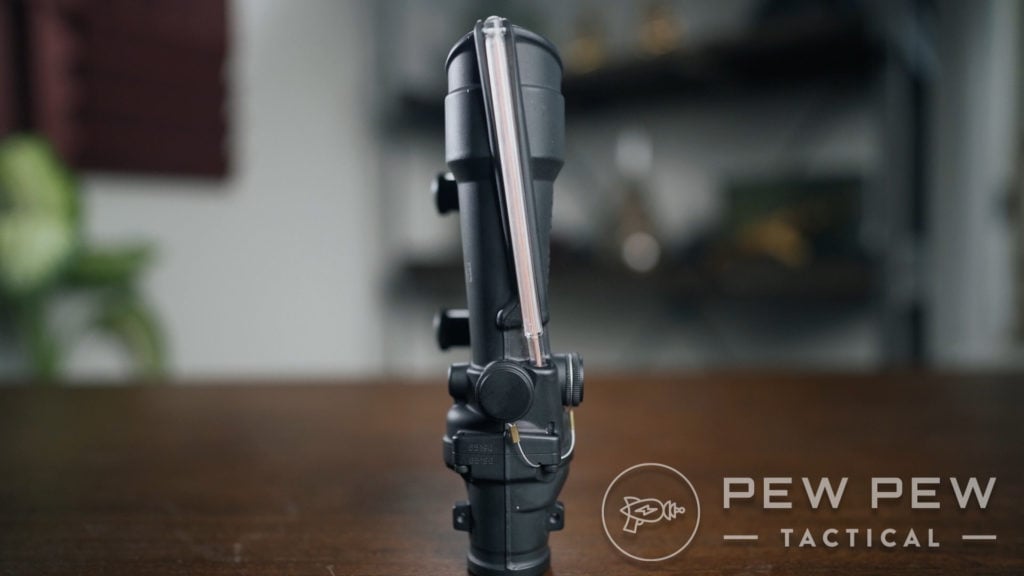
As compared to the 648’s strip of fiber optic that sits perpendicular to the plane of the scope itself, the elongated optic combined with the tritium on the 11F lends a comparable level of daytime brightness as the battery-powered TA02.
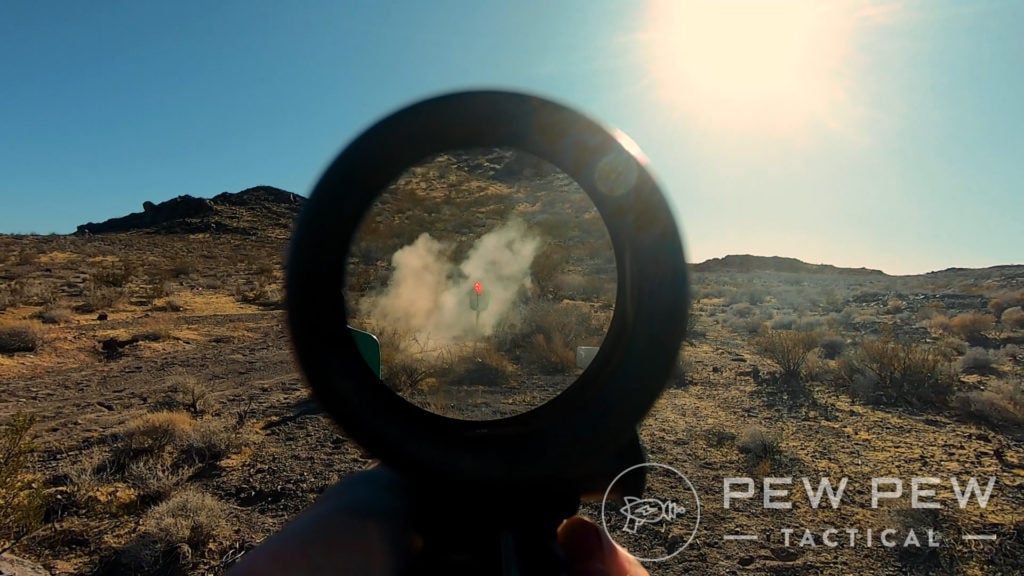
We actually had some issues zeroing the 11F at first – we had maxed out the elevation knob to the lowest setting it can be adjusted to and were still hitting high on our 200 yard steel
But, we eventually realized that we’re dipshits and had mounted the optic slightly offset from the Picatinny rail on our AR, causing the optic to sit at a stupid diagonal angle.
Absolutely our fault, and once we got it fixed, getting it zeroed was business as usual.
There’s not a ton to say about this individual model, and we’re not entirely sure why you’d want a 3.5x optic when the vast majority of ACOGs are 4x – but it does it’s job fine!
Just about the same eye relief as the other models above, with maybe just a smidge of faster target acquisition speed considering the slight reduction in magnification.
You’ve got your standard RMR mount included as well.
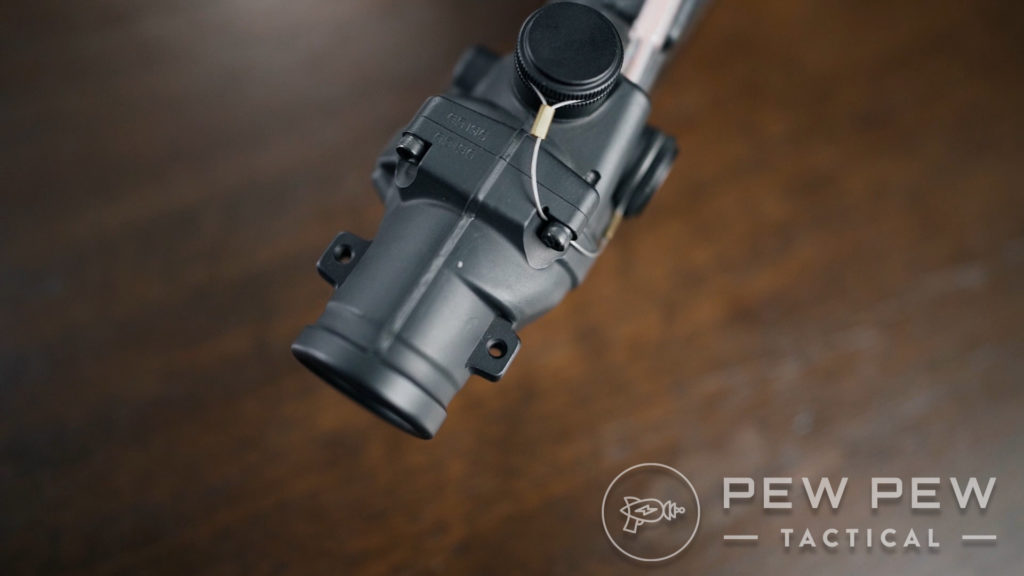
and we wish that we could show you what an RMR looks like, but unfortunately, ours permanently lives on one of our Grey Ghost Precision glock slides due to some stripped Allen screws. We don’t want to talk about it.
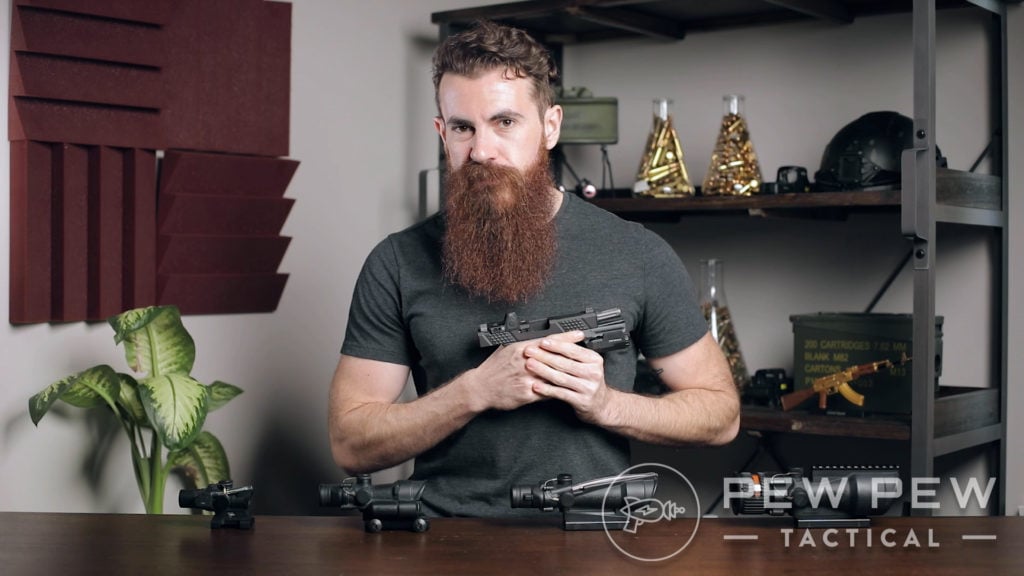
The TA11F comes in at about $1600 – and like we said, is pretty no frills as far as ACOGs go, but even a no frills ACOG is still a damn cool and high quality optic.
Prices accurate at time of writing
Prices accurate at time of writing
-
25% off all OAKLEY products - OAKLEY25
Copied! Visit Merchant
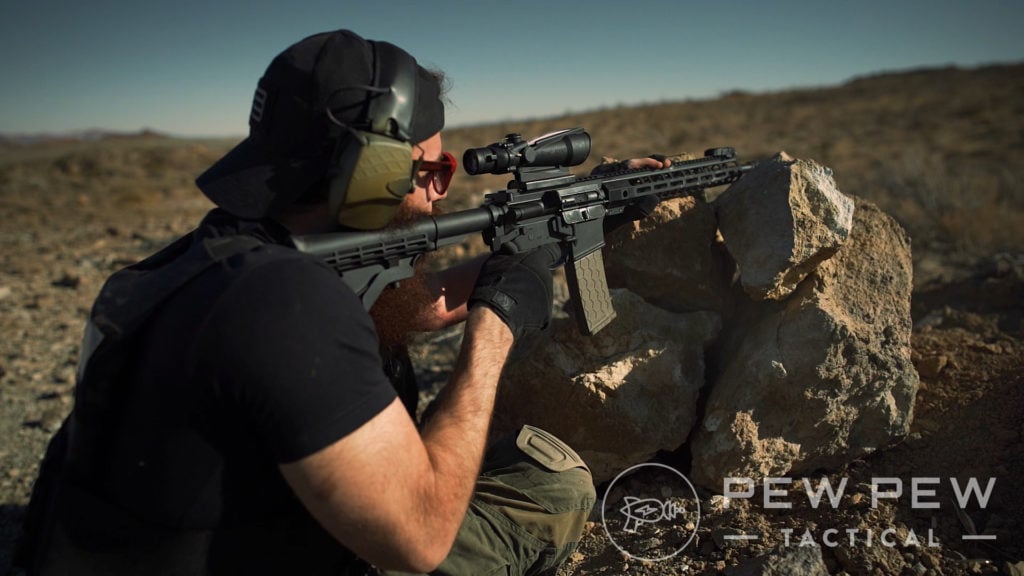
4. Trijicon TA44-C 1.5x16mm ACOG
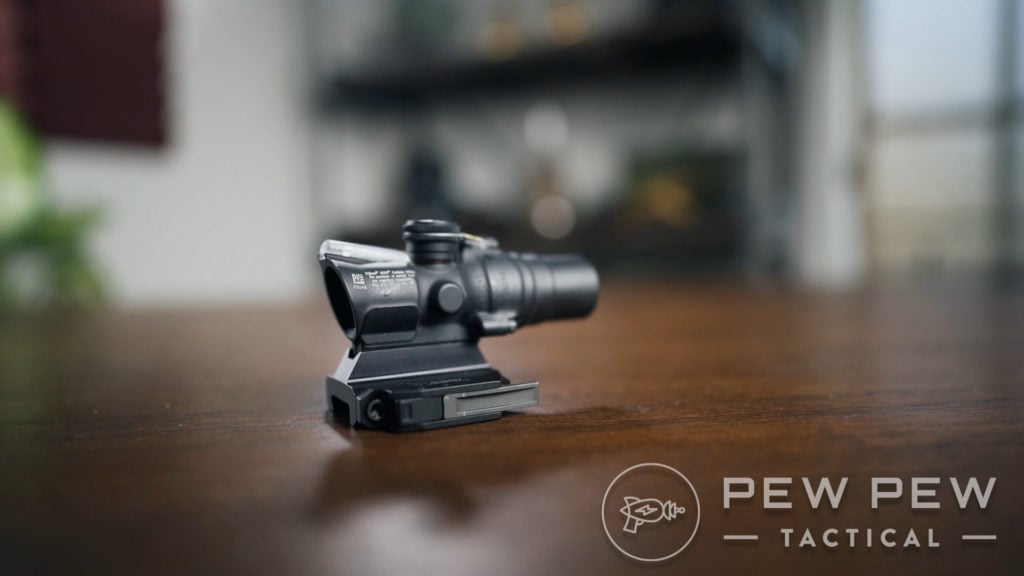
The TA44-C is a 1.5x zoom tiny boy that sort of sits in a weird middle ground between rifle scope and red dot.
Honestly, this one’s pretty out there. The green reticle and fiber optic are pretty rad and way brighter / clearer than any green red dots we’ve fired, but – it’s still an ACOG, with an ACOG’s eye relief.

For us, this feels a bit odd, as the 1.5x zoom and super low profile (for an ACOG) mean that it’s obviously intended more for fast target acquisition and close up shots.
But the fact that you’re not going to have a clear view through the optic unless your eyes are in the exact right spot means that it doesn’t do that job quite as well as your standard holographic or red dot sight, in our opinions.
We also mounted the 44-C to a Bobro throw lever mount – giving it just enough height to be able to used comfortably on a standard AR- flat top rail.
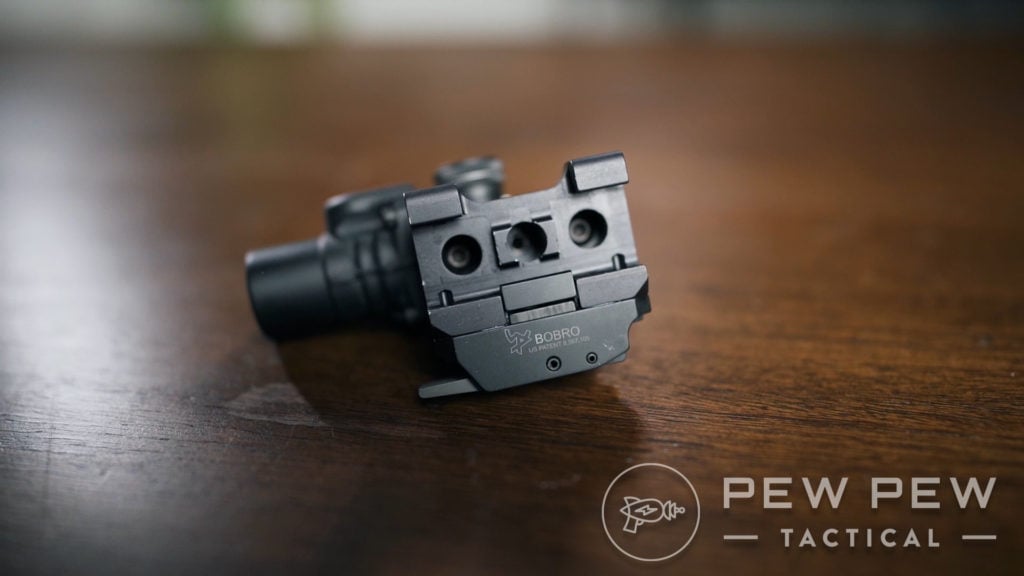
While this is one of the lightest ACOGs around at just 4.9oz, we’re not super sure what you’d actually use this for. Trijicon advertises the optic as being for both CQB teams or competition shooters, but… Ehhhh?
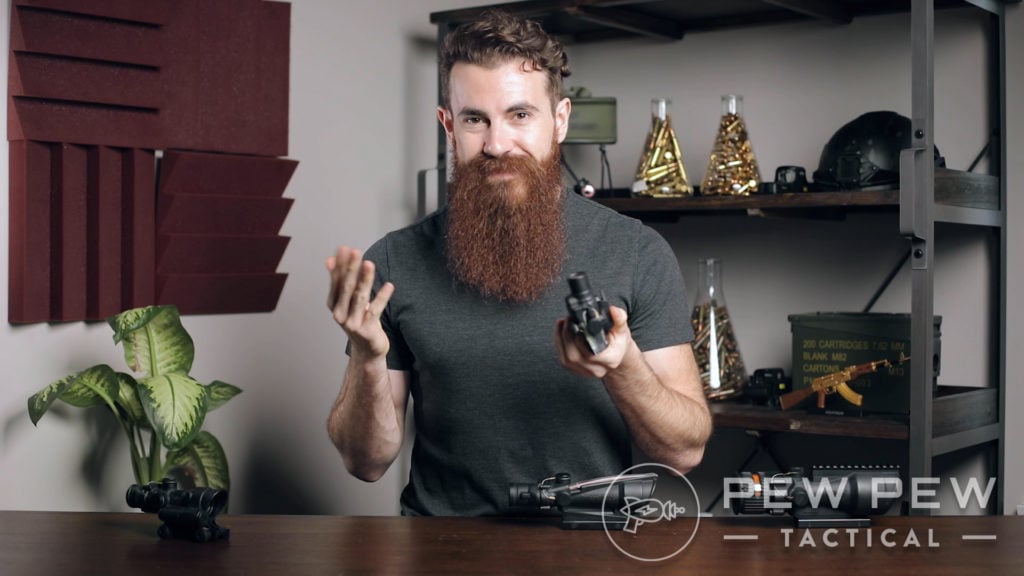
With an MSRP of $1200, we’d probably pass on thet 44-C – but if any of you that are using one see this, we’d love to hear exactly why we’re wrong in the comments section below.
Prices accurate at time of writing
Prices accurate at time of writing
-
25% off all OAKLEY products - OAKLEY25
Copied! Visit Merchant
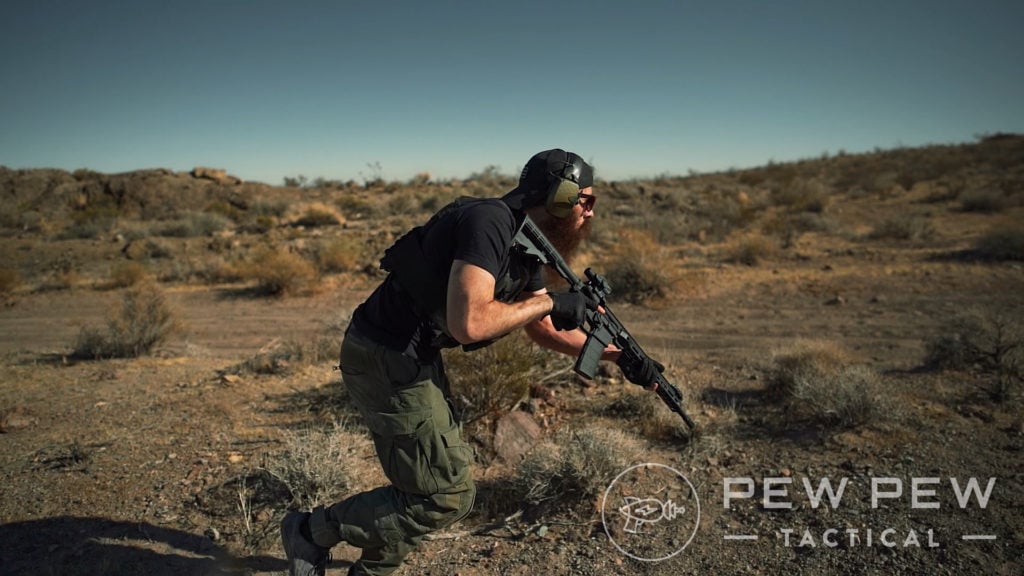
Modularity
Lastly, you can add a Trijicon RMR to the top of an ACOG via a very simple plate. This is a very simple upgrade that does give you a super close range option for close quarter’s shooting. The RMR is easily the most robust miniature red dot on the market, so it’s a faithful companion to the ACOG.
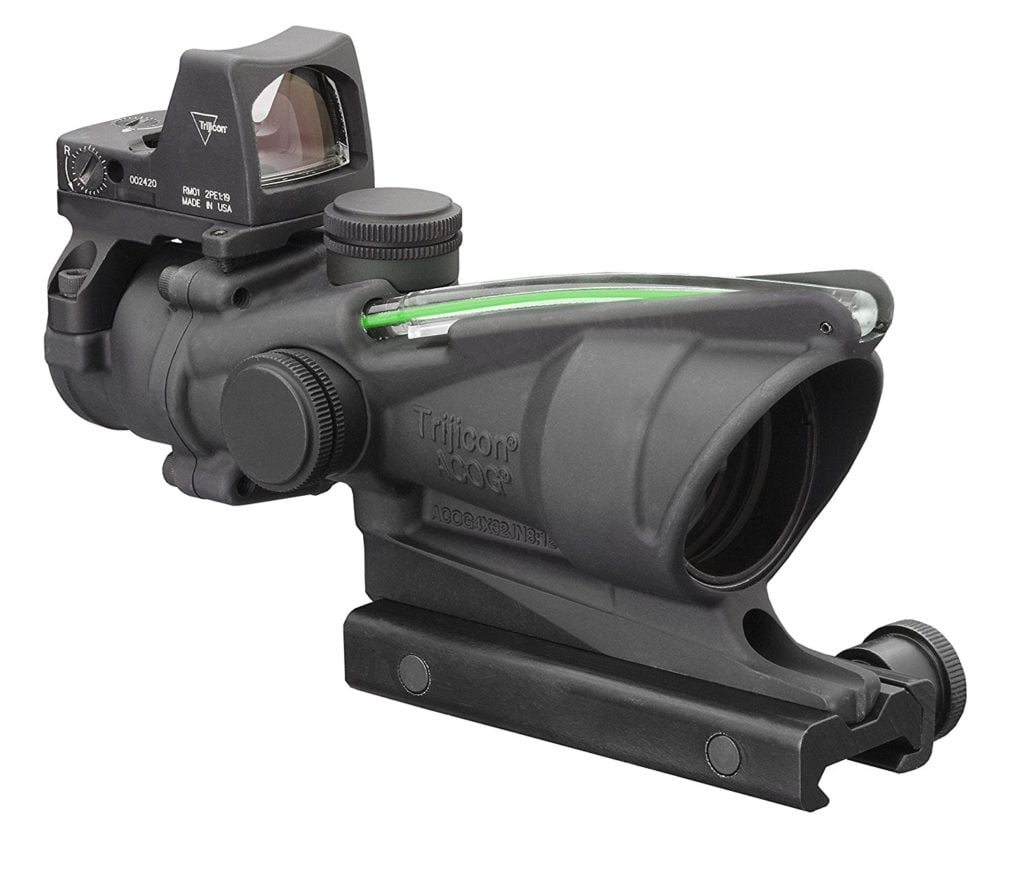
Trijicon RMR – also perfect for pistols.
Prices accurate at time of writing
Prices accurate at time of writing
-
25% off all OAKLEY products - OAKLEY25
Copied! Visit Merchant
Another Cog in the Gears
The Trijicon ACOG is an outstanding rifle combat optic. It’s served its country well with the USMC, the Army, and Air Force. The Trijicon ACOG is a rugged, reliable and well designed and thought out combat optic.
The Gold Standard might be the TA31 but we had a great time with these four other models.
Prices accurate at time of writing
Prices accurate at time of writing
-
25% off all OAKLEY products - OAKLEY25
Copied! Visit Merchant
Make no mistake the Trijicon ACOG is a combat optic.
It’s designed with fighting in mind, and that’s where the design comes from. Sure it can be used for other things, but its design is focused on combat, so remember that.
This is my favorite rifle combat optic (so far) but what’s yours? Check out more of our favorites in Best AR-15 Optics.
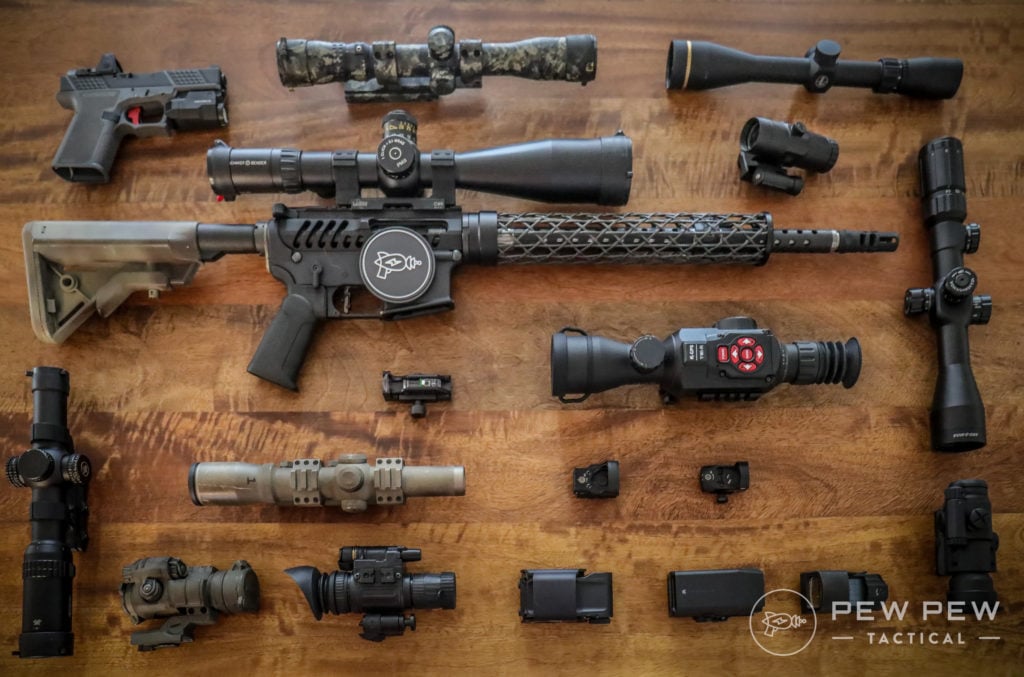

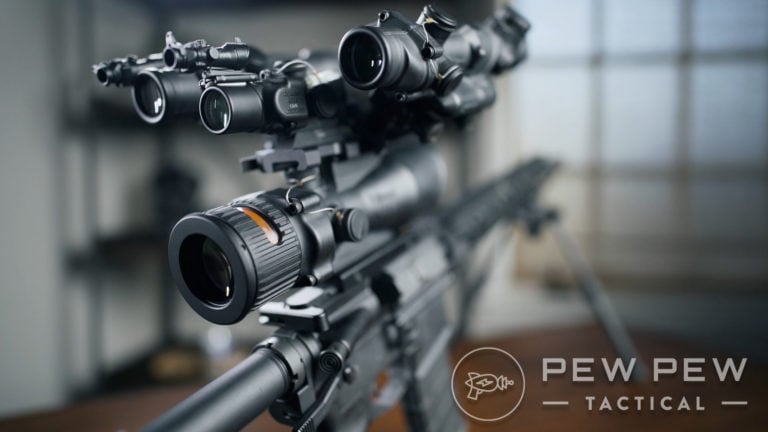





13 Leave a Reply
Your pop up blocked the site again. I shouldn’t have to click away debris to read your page.
Absolutely the best firearms review I have ever read (and I've been reading this stuff since age 10, 79 now). I purchased a TA11 for use on a 6.5 Creedmoor, as the 308 is the closest i can come to 6.5 Creedmoor but i think after comparing ballistics, it will be pretty darn close. Reading about a Marine's experience gives me confidence in its durabilty. Semper Fi, Marine
I use the TA11 because the eye relief is fantastic!
So these are designed for specific caliber sizes, how does barrel length play into this?
The TA-44 does have a lot going for it. Especially with the ACSS reticle. The .5x power gathers light and keeps that advantage. It also has a large window box and a lot of eye relief at least in the ACSS model. It obviously does better in close with the long eye relief. The other advantage of it being slightly magnified is it makes it easier to see in darker places. Instead of just seeing a window you can see inside the structure that the window is in. It's more of a red dot but does give you a couple of advantages over a red dot.
The crap about the TA44s eye box and relief is BS and makes me wonder if this guy actually did any shooting with one. I've been running a TA44 for a LONG time. For me, it operates just like a red dot. For those of you that don't see a place for it, stick with your red dots. For those of you with failing eyes, a 50% larger target to aim at is mighty handy. Using BAC, engaging close targets isn't a problem at all due to the generous eye relief and eye box. Once you get past 25 yards, it really starts to show what it's good for. I've found that, due to the clarity of the glass, it works better than a red dot with a 3x magnifier.
I have the 1.5 ACOG on a suped-up little .22 build that I geeked out and totally overbuilt.
Really works for that application.
However, even though I am an ACOG evangelist (ran them in Afghanistan and Iraq),
I would not put the 1.5 on any serious weapon. Does not have real combat application.
But again, really fun little optic for a .22
I have been wondering this for a while. You stated the bdc was in meters then you switched to yards. Which is it? I have the RCO ta31
Great article. Like you, lots of gun time with Trijicon sights downrange and they are incredible. I got to play with a thermal sight one of the SEAL's in our group had. It was orange hot instead of white which was amazing and no night vision problems. Definitely the coolest sight I've used.
There was one key thing that you didn’t mess with the acog’s when mounted on top of the carrying handle. That is when mounted to the handle it has a hole through it that allows you to utilize your iron sites without removing the acog. This is a feature that I love and I use on my TA 31.
Gosh, I'm an old fart from Vietnam days, I live on Social Security and would like a combat scope but over $1000. for the least expensive one? Did I read that right?
Brokedown Marine
This article was focused on Trjicon… pleny of quality options for regular folks, Burris and Vortex make suitable solutions for shooting at things that don't shoot back.
Great article devil. My unit happen to be deployed with the TA31F. BAC takes a little getting use to but it works likes a charm. I concur on the bright days cons of ACOGS. Luckily, we grunts always carry black electrical tape or grey duct tape for every field fixer-uppers. ACOGS were alot easier to use than our issue Steiners and less cumbersome. We spot IED'S with it and employ our "Guardian Angel " and NO BETTER FRIEND NO WORST ENEMY" ethos. (Thanks to St. Mattis. Patron St. of Chaos.)
Sgt. Alphatraz
OIF 2-3
AL ANBAR IRAQ